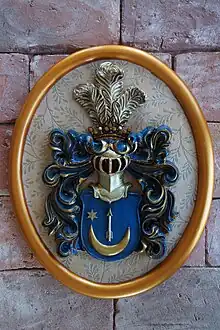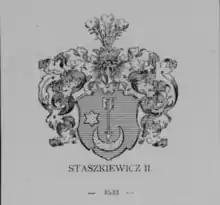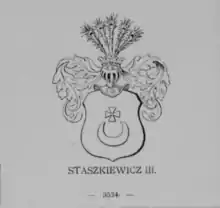| Staszkiewicz family Staszkiewicze, Staškevičiai, Сташкевичі, Сташкевичи | |
|---|---|
 Staszkiewicz family Coat of Arms | |
| Current region | Poland, Lithuania, Belarus, Ukraine |
| Place of origin | Duchy of Samogitia |



The Staszkiewicz family (Polish pronunciation: [staʂˈkʲɛ.vʲit͡ʂ] Polish: Staszkiewicze, Lietuvių: Staškevičiai, Українська: Сташкевичі, Stashkevychs; Русский: Сташкевичи, Stashkevichs) is a Polish-Lithuanian noble family[1][2][3][4] of ancient lineage originating from the Duchy of Samogitia.
The first known reference to the family is in the 1528 census of the Grand Duchy of Lithuania[5] where they are recorded living in the voivodeships of Samogitia, Trakai, and Vilnius.
Nineteenth century documents record the family in additional territories: Vitebsk, Podolia,[6] Kovno, Mogilev, Kiev, and Volhyn.
Heraldry
Kasper Niesiecki records the Staszkiewicz family coming from the Duchy of Samogitia and states their coat of arms is a variation of Leliwa coat of arms.[1]
Juliusz Ostrowski records the Staszkiewicz coat of arms (I & III) as variations of Sas coat of arms[7] and also records, referencing Niesiecki, version II as a variation of Leliwa.[7]
An 1819 confirmation of nobility records a branch of the Staszkiewicz family using the coat of arms Kroje.[8]
Notable Members
- Andrzej Staszkiewicz Podsędek of Upytė in 1615.[9]
- Rafał Staszkiewicz Stolnik of Smolensk in 1625.[10]
- Michał Staszkiewicz Cześnik of Upytė in 1788.[1]
- Franciszek Staszkiewicz proboszcz of Lanckorońa and benefactor of funds for the renovation of Kalwaria Zebrzydowska.[11]
References
- 1 2 3 Niesiecki, Kasper; Bobrowicz, Jan Nepomucen (1841). Herbarz polski Kaspra Niesieckiego S.J. (in Polish). Wydawnictwa Artystyczne i Filmowe.
- ↑ Gajl, Tadeusz (1999). Polskie rody szlacheckie i ich herby (in Polish). Wydawn. Benkowski.
- ↑ Ciechanowicz, Jan (2001). Rody rycerskie Wielkiego Księstwa Litewskiego (in Polish). FOSZE. ISBN 9788387602802.
- ↑ Starykoń-Kasprzycki, Stefan Janusz (1938). Polska encyklopedia szlachecka (in Polish). Wydawn. Instytutu Kultury Historycznej.
- ↑ Lithuanian State Historical Archive, F. 708, ap. B. 2694
- ↑ "Список дворян, внесенных в родословную книгу Подольской губернии (1897)". irbis-nbuv.gov.ua. Retrieved 2018-10-30.
- 1 2 Ostrowski, Juliusz (1855-1917) (1897–1906). Księga herbowa rodów polskich. Cz. 1 / Juliusz Ostrowski. [druk:] Józef Sikorski.
{{cite book}}: CS1 maint: numeric names: authors list (link) - ↑ Lithuanian State Historical Archive, Fond 391, folder 1, item 1553
- ↑ Wittyg, Wiktor. (1908). Nieznana szlachta polska i jej herby. Druk. uniw. Jagiellońskiego. OCLC 250026664.
- ↑ Lithuanian State Historical Archives, Fond No. 391, Inventory No. 1, File No. 1690
- ↑ Stupnicki Hipolit (1806 - 1878) (1862). "Herbarz polski i imionospis zasłużonych w Polsce ludzi wszystkich stanów i czasów; ułożony porządkiem alfabetycznym na podstawie Herbarza Niesieckiego i manuskryptów. Tom III" (in Polish).
{{cite journal}}: Cite journal requires|journal=(help)CS1 maint: numeric names: authors list (link)